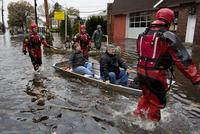-
Resources on disaster preparedness, resilience

One year after Superstorm Sandy hit the eastern United States, local, state, and federal agencies as well as community groups and businesses are working to strengthen the U.S.s resilience to future disasters. A National Research Council (NRC) has issues a series of studies and reports, and has put together workshops and study groups, which should advance the national conversation on preparedness and resilience.
-
-
Zapping bugs dead

Restaurants and supermarkets could save millions of dollars by hanging on to bug zapper bulbs instead of tossing them every year as they normally do, a new study has found. What is more, the benefits could extend to the environment by keeping some of the bulbs’ mercury out of the waste stream.
-
-
Bill bolsters DHS’s cybersecurity workforce
A House panel recently approved HR 3107, a bill aiming to bolster DHS’s cybersecurity workforce. The House Homeland Security Committeeamended the Homeland Security Cybersecurity Boots-on-the-Ground Actto expand DHS’ outreach to candidates for IT security jobs by creating a tuition-for-work fellowship and a program to recruit military veterans and unemployed IT specialists for DHS employment.
-
-
U.S. policy should encourage foreign Ph.D. students to stay: study

Attracting more talented foreign students to study at U.S. universities and encouraging them to launch entrepreneurial ventures here could help “revitalize innovation and economic growth” in this country, three economists conclude in a new study. The researchers have found that high-performing foreign-born Ph.D. students improve the “creation of knowledge” in U.S. universities. When knowledge is created, it tends to drive entrepreneurial investment and economic growth.
-
-
2012 sees slowdown in the increase in global CO2 emissions

Actual global emissions of carbon dioxide (CO2) reached a new record of 34.5 billion tons in 2012. Yet, the increase in global CO2 emissions in that year slowed down to 1.1 percent, which was less than half the average annual increase of 2.9 percent over the last decade. This is remarkable, as the global economy grew by 3.5 percent. This development signals a shift toward less fossil-fuel-intensive activities, more use of renewable energy, and increased energy saving. Increases in fossil-fuel consumption in 2012 were 2.2 percent for natural gas, 0.9 percent for oil products, and 0.6 percent for coal.
-
-
DHS, FDA: Decorative contact lenses for Halloween costumes are risky
Many will celebrate Halloween today, and federal officials are warning the public about the dangers associated with counterfeit decorative contact lenses. Decorative and colored lenses are becoming increasingly popular, especially around this time of year. Several federal agencies have teamed up to launch Operation Double Vision – already underway — to seize illegal, harmful products from store shelves.
-
-
Trustev closes $3 million seed funding round
According to research by eMarketer, global e-commerce sales are expected to reach nearly $1.3 trillion in 2013, making online fraud prevention an urgent and important requirement for every merchant. Trustev addresses this requirement by using multiple dynamic data sources to independently verify a user’s identity on e-commerce sites. The company has just closed a $3 million seed funding round to finance the further development of its e-commerce security and online fraud protection technology.
-
-
U.S. tech companies increase lobbying efforts related to surveillance, NSA
Technology firms Apple, Google, Facebook, and Microsoft, among other tech powerhouses, are quietly increasing lobbying efforts directed at government surveillance laws as they seek to have a say in what Congress does regarding surveillance reforms and National Security Agency (NSA) programs. Traditionally, tech firms have not pushed for restrictions on the ability of the U.S. intelligence community to collect data, and it is not clear what position these industry leaders will take, whether they plan to take a position at all, or whether they will present lawmakers with a united industry front.
-
-
Start-ups offer law enforcement innovation, flexibility, and low prices
Start-ups offer innovation and flexibility in addition to lower price points. The influx of start-ups into the law enforcement and security supply market is in its early stage, and while few start-ups have begun to compete with traditional, and much larger, players, law enforcement units appear to be attracted to the innovation and lower prices offered.
-
-
Mobile phone use a significant security risks for companies
New research suggests that companies are leaving themselves open to potentially serious security and legal risks by employees’ improper use of corporate mobile devices. Experts looked at a sample of mobile phones returned by the employees from one Fortune 500 company and found that they were able to retrieve large amounts of sensitive corporate and personal information. The loss of data such as this has potential security risks, inviting breaches on both an individual and corporate level.
-
-
Scientists: Shale oil and gas may not be U.S. energy salvation
After ten years of production, shale gas in the United States cannot be considered commercially viable, scientists say. They argue that while the use of hydraulic fracturing and horizontal drilling for “tight oil” is an important contributor to U.S. energy supply, it is not going to result in long-term sustainable production or allow the United States to become a net oil exporter.
-
-
Russia to build floating nuclear power plants

Global warming is opening the Arctic Ocean to shipping – and causing the rapid melting of Arctic ice. Russia says that ship-based nuclear power plants would allow it to provide power to remote cities in Siberia, and provide power to oil and gas drilling operations in the Arctic (about 30 percent of the world’s unclaimed natural gas is in the Arctic, and about, 60 percent of that unclaimed natural gas is in the Russian Arctic). Experts worry about the ability of ship-based nuclear reactor to withstand extreme weather events, or terrorist attacks. The U.S. Army deployed its own floating nuclear reactor – the Sturgis – in the Panama Canal Zone from 1968 to 1976.
-
-
Cyphort, a threat monitoring specialist, raises $15.5 million Series B funding
San Jose, California-based Cyphort, Inc., a company specializing in advanced threat monitoring and mitigation platform, has closed in $15.5 million Series B funding. The round was led by Menlo Park, California-based Trinity Ventures with participation from existing investors Foundation Capital and Matrix Capital. Cyphort’s platform blends multi-phase behavioral analysis, machine learning, and correlation to provide businesses with real-time detection, context, and mitigation for advanced malware attacks that bypass traditional security and first generation APT solutions.
-
-
NIST seeks public comments on updated smart-grid cybersecurity guidelines
The National Institute of Standards and Technology (NIST) is requesting public comments on the first revision to its guidelines for secure implementation of “smart grid” technology. The draft document, NIST Interagency Report (IR) 7628 Revision 1: Guidelines for Smart Grid Cybersecurity, is the first update to NISTIR 7628 since its initial publication in September 2010.
-
-
Where should U.S. radioactive waste be buried?
In the United States, about 70,000 metric tons of spent commercial nuclear fuel are located at more than seventy sites in thirty-five states. Shales and other clay-rich (argillaceous) rocks have never been seriously considered for holding America’s spent nuclear fuel, but it is different overseas. France, Switzerland, and Belgium are planning to put waste in tunnels mined out of shale formations, and Canada, Japan, and the United Kingdom are evaluating the idea.
-
- All
- Regional
- Water
- Biometrics
- Borders/Immig
- Business
- Cybersecurity
- Detection
- Disasters
- Government
- Infrastructure
- International
- Public health
- Public Safety
- Communication interoperabillity
- Emergency services
- Emergency medical services
- Fire
- First response
- IEDs
- Law Enforcement
- Law Enforcement Technology
- Military technology
- Nonlethal weapons
- Nuclear weapons
- Personal protection equipment
- Police
- Notification /alert systems
- Situational awareness
- Weapons systems
- Sci-Tech
- Sector Reports
- Surveillance
- Transportation
Advertising & Marketing: advertise@newswirepubs.com
Editorial: editor@newswirepubs.com
General: info@newswirepubs.com
2010-2011 © News Wire Publications, LLC News Wire Publications, LLC
220 Old Country Road | Suite 200 | Mineola | New York | 11501
Permissions and Policies
Editorial: editor@newswirepubs.com
General: info@newswirepubs.com
2010-2011 © News Wire Publications, LLC News Wire Publications, LLC
220 Old Country Road | Suite 200 | Mineola | New York | 11501
Permissions and Policies
